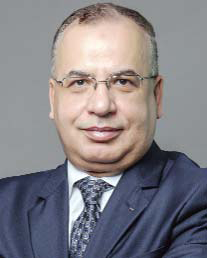 DUBAI: There was a time, not too long ago when smart phones were a work of fiction and wearable technology, unheard of, a time when the word 'smart' was used to describe 'people' not devices or style of living. Take a look around you, the world has drastically changed.
DUBAI: There was a time, not too long ago when smart phones were a work of fiction and wearable technology, unheard of, a time when the word 'smart' was used to describe 'people' not devices or style of living. Take a look around you, the world has drastically changed.
Whether we're working, learning, playing, purchasing or we're traveling, managing our finances, keeping fit or watching TV, we expect faster, more streamlined access to services, all-the-time, access on all our devices. We above all expect a more personalized digital experience... with no compromise.
In parallel, the world is urbanizing at an astonishing rate. As per the United Nations, by 2050, around 70% of the world's population will be concentrated in urban centers, as compared to 54% in 2014. The GCC countries are widely expected to have one of the highest urbanization rates in the world, ranging from 80% to 100%. Traffic congestion continues to accelerate, as does pollution. Essential supplies such as power and water are getting depleted and before we know it the number of people living in cities will well surpass the available resources and infrastructure. Governments have to think of better ways to manage the cities and to allocate their resources. The Smart City is a survival necessity - an agile infrastructure, adaptive to the sudden swing in the supply-demand cycle.
Introducing... the Smart City, a way for governments to enable a better quality of life through efficient city management, better allocation of resources, economic development, sustainability and innovation
Smart grids, with smart meters and homes or just smart appliances allow the city to better manage their energy supply by optimizing the use of non-renewable sources of energy while enabling the conversion of waste to create renewable sources of energy. Smart roads and transportation with integrated sensors and CCTV lead to intelligent traffic management system, not just minimizing frustration on the roads but also improving safety and enabling faster response to emergencies. It also helps businesses cut back on pollution while reducing costs and improving time to market through multi-modal transport. CCTV surveillance combined with real time data analytics reduces, if not prevents, crimes leading to a much safer living environment. Connected, integrated wearables and intelligent Internet-connected devices transmit and analyze health and vital functions data in real time resulting in faster response, early and accurate diagnostic and preventive treatment leading to a healthier community and better healthcare costs.
FUTURE-PROOF ROBUST SMART CITY
We are witnessing the emergence of data-driven communities inhabited by Digital Citizens with information at their fingertips, who expect always-on personalized superior level of services. For an urban center to transform into future-proof robust Smart City it needs a strong ICT foundation that give it an agile, flexible and cost effective software-defined infrastructure for faster provisioning of additional on-demand citizen services. These cities need a Data Lake Layer that allows for faster aggregation, management and analysis of data that's transmitted and received from the Internet of Things so as to enable actionable and predictive insights that are required for happier, safer living and working environments. Above that, smart cities need the application layer for disseminating all the information and services that cities need to bring to fore for their citizens, residents and wider community... This allows for cities to develop, modify and scale their cloud native applications and services in a shorter period of time thus accelerating market innovation and growth.
Does this mean that cities should throw away every ICT investment made and start building their ICT foundation from scratch?
Absolutely not!
A smart city is a long-term multi-phased IT project. It starts with putting a comprehensive strategy that involves all stakeholders and that has an ultimate objective. The implementations should start from the existing infrastructure and focused services moving gradually to the wider network of services and full integration. This is by far a more sustainable and scalable model.
The strategy for a smart city must cover data security, accessibility, and privacy. Any breach in data security will impact the trust of citizen in their governments. Therefore, a smart city should ensure integration of security solutions such as data encryption and identity and access management, and security monitoring and analysis, to ensure the safety and integrity of city networks. There is also a strong need for cybercrime laws and data laws to govern the use of the vast amounts of data shared.
We have definitely come a long way and are witnessing the start of a fantastic journey where we are all working towards the same goal - happiness. Smart cities are no longer just a vision, thanks to our government, it is a reality as they continue to introduce smart apps, innovative services across utilities and transportation departments to provide us with faster, more efficient services but it is not their work alone. In order to achieve this objective, we must all work as one, governments, city planners, utility providers, ICT and infrastructure suppliers together with the citizens and residents to ensure that the building blocks are being leveraged effectively and ultimately addressing the end goals of the city. As they say, all for one and one for all.
Mohammed Amin is a Senior Vice President and Regional Manager, Turkey, Eastern Europe, Africa, and Middle East, EMC Corporation.
By: Mohammed Amin









